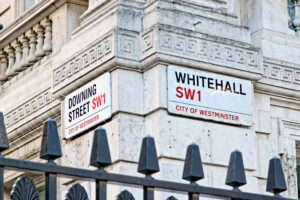
Boris Johnson’s plans to slash the number of civil servants by 91,000 – around 20% – within three years, will leave Whitehall unable to handle the huge extra workload caused by Brexit, independent experts and unions have warned the government.
They say such a reduction would leave the state too small to cope with the added responsibilities taken on by officials in Whitehall since the UK left the EU, including in areas of trade, agriculture, immigration and business regulation.
This weekend the TUC releases figures showing that the planned cuts would mean the ratio of civil servants to members of the UK population would fall beneath the low recorded after former chancellor George Osborne’s ruthless austerity drive, when government departments were told to pare back numbers to achieve savings of up to 40% after the 2010 general election.
The TUC figures show that for every 10,000 UK citizens, the number of civil servants fell from 76 in 2010 to 59 in 2016, the year of the Brexit referendum. By last year, in order to deal with the extra workload from planning and implementing Brexit, the numbers had risen again to 70 for every 10,000 UK citizens.
However, if the three-year target to cut numbers by 91,000 were achieved, the TUC says the number of civil servants would drop to a new low of just 56 per 10,000 by 2025 – despite the extra demands placed on government from Brexit, the pandemic and the war in Ukraine.
Cabinet ministers and the permanent secretaries of all government departments have been given until the end of June to model scenarios involving cuts of 20%, 30% and 40% in the numbers of civil servants working for them. The overall reduction of 91,000 is highly unlikely to be shared equally, meaning some parts of government will be asked to cut by more than 20% and some by less.
The difficulties of managing, let alone making a success of Brexit while slashing the size of the state are highlighted by separate figures from the Institute for Government (IfG) thinktank, which says that, since 2016, the Home Office has added 8,400 staff, many of whom are managing the new immigration policies and processing visas from the EU for the first time.
Both Defra (the Department for Environment, Food and Rural Affairs) and BEIS (the Department for Business, Energy and Industrial Strategy) have seen their staffing levels increase by 5,000 since 2016, taking on the regulatory and policy roles previously performed by EU officials.
Rhys Clyne, a senior researcher at the IfG, told the Observer: “Ministers should explain why they believe the pre-Brexit size of the civil service in 2016 is the most efficient size for the civil service nearly a decade later in 2025.
“The UK government now has new post-Brexit responsibilities that will need to be resourced and cannot be dropped or easily unwound.”
Steven Littlewood, assistant general secretary of the First Division Association, which represents senior civil servants, said Whitehall was being cut to the bone.
“Given the new responsibilities the government has post-Brexit for areas like borders, customs and agriculture, it is impossible to see how it can provide the services it currently is with the proposed job losses. The government needs to be honest about what services it would cut if it reduces numbers.”
The former Cabinet Office minister Francis Maude, who oversaw the swingeing cuts in civil service numbers under the coalition government headed by David Cameron and Osborne, is being lined up by Johnson to lead a review into how the civil service operates in future.
There are also warnings that reducing the number of officials will worsen delays in applications for passports, driving licences and other government services.
Mark Serwotka, general secretary of the Public and Commercial Services Union, the largest civil servants’ union, said: “Making cuts will only make things worse, make waiting lists longer for those seeking passports and driving licences and make telephone queues longer for those with tax enquiries.
“We shall fight for every job in the civil service. Not just on behalf of our members but on behalf of every member of the public who relies on the services they provide.”
Prof Anand Menon, director of the thinktank UK in a Changing Europe, said the problem for Johnson was that Brexit demanded a larger state “not just to implement it in the short term but to carry out all those additional functions Brexit will require the UK to carry out. These range from devising and implementing new policies in areas like agriculture and trade policy, to carrying out new regulatory functions, to policing our borders.”
Read more:
Civil service cuts will leave Whitehall unable to cope with Brexit workload